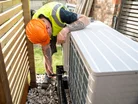Why Heat Pumps Will be Vital to Net Zero Targets

How can the UK Government help heating contractors meet Net Zero goals?
We need more certainty on the retrofit agenda, specifically regarding funding schemes and implementation timelines. We require clarity on financial support availability and rollout timelines, often via social landlords.
This includes grants and subsidies to make upgrades affordable for businesses and homeowners. With this clarity, we can confidently invest in recruiting, training, and upskilling staff. The transition to low-carbon technologies like air source heat pumps demands a workforce trained in installation, maintenance, and advisory roles. Without clear government backing, investing in upskilling is risky as future demand for these skills is uncertain.
Strong commitment and a well-defined framework from the government will enable businesses to boost recruitment and create green jobs."
Is there a shortage of expertise in retrofitting low-carbon heating systems?
Yes. Successful installation requires years of experience with traditional heating and plumbing systems, which vary significantly between properties.
Air source heat pumps, for example, demand both electrical and plumbing know-how, making specialised training essential. The technology is constantly evolving, requiring ongoing skill development for installation and maintenance.
Continuous training and hands-on experience are critical; it's not a one-off learning curve but an ongoing investment. Without proper resources and commitment, we can't meet growing demand or deliver these systems effectively.
Is there more that can be done on training?
We need to invest in the next generation of workers, but hiring apprentices comes with commercial challenges. New, inexperienced people require extra staff and resources for training, which is especially challenging for SMEs.
Seasoned installers, paid on project completion, may be reluctant to take on apprentices as it can slow them down. I believe companies should not bear the full weight of funding apprenticeships. The central government should play a larger role in financing training and employment.
The business landscape has changed significantly, with shorter contracts and less stability, making it harder to justify training investments.
Could more be done on education around air source heat pumps?
Absolutely. The messaging in the media has been too negative, and it's time for a shift. Government needs to promote this technology more positively. We face confusion and distrust from people who don't understand the technology, leading to installation pushback.
Early engagement is key, but it requires time to explain the long-term impact. We need earlier education on why heat pumps and low-energy tech are the future. An education program highlighting renewable energy benefits could shape public opinion and drive demand for heat pumps."
What other areas can heat contractors be better supported?
One of our biggest hurdles is lack of support from Distribution Network Operators (DNOs). Installing heat pumps requires coordination with local electricity providers due to increased infrastructure demands. DNO delays can kill momentum, often causing tenants to change their minds.
Greater government awareness and pressure could speed up installations and help us hit targets. We want a national plan for net-zero retrofits and fast-tracked agreements between DNOs and social landlords. Solving this issue is crucial for meeting the country's Net Zero targets and benefiting everyone involved.
- How Data is Driving McCarthy's Sustainability TransformationSustainability & Green Building
- How Fluor is Building a Better WorldEPC
- How Is Amazon's Mass Timber Station Aiding Sustainability?Sustainability & Green Building
- Global Coalition Targets Green Finance for Building SectorSustainability & Green Building




